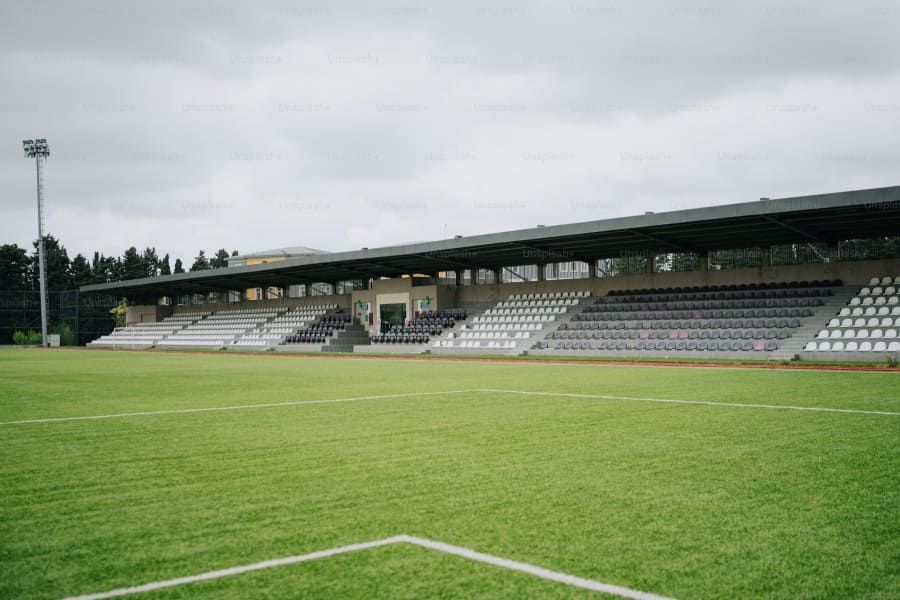You will hear a guide talking to members of the public who are visiting a football stadium in the UK.
First, you have some time to look at questions 11 to 14.
Now listen carefully and answer questions 11 to 14.
Good morning and welcome to City Football Club.
I'd like to give you some useful information about your visit to the stadium today and then we'll start the tour of the areas of the stadium that are open to visitors.
I can see lots of children here today, so just to let mums and dads know a few things before we start.
The stadium has lots of stairs and the players' tunnel is very dark.
Please don't let your children wander off on their own, even for a minute.
We don't want any accidents or anyone getting frightened.
Cameras are permitted everywhere and you can take pictures of your child shooting a penalty.
Assistants are helping to organise this and hopefully the queue won't be too long.
It's very hot and sunny out on the pitch today.
You can get food and drink at the cafe and I really recommend the healthy lunchboxes for children.
Also in the cafe, children are invited to do a football-themed drawing.
We'll pick the best one at the end of the afternoon, so don't forget to put your name and contact details on the back.
That way, if you've left the stadium before then, we'll send your prize, but sadly we can't return drawings.
I'd like to mention some features of the tour.
We'll start with the 360 cinema experience, which has been very popular over the years, and then I'll take you to the players' dressing rooms, before going outside to the seating area and the pitch.
I should say, if you'd prefer your visit to be self-guided, please collect headphones from the reception and then you can listen to the pre-recorded information at your own speed.
We've only just introduced this feature and would appreciate your feedback.
We're thinking of offering tours in other languages in future, so if you have any thoughts on that, we'd welcome those too.
If you plan to return another time, you might like to book one of our VIP tours.
We've only just started offering these and they can be booked online.
Before you hear the rest of the talk, you have some time to look at questions 15 to 20.
Now listen and answer questions 15 to 20.
Now, the stadium you see today was built in 1989, as part of a three-year redevelopment project.
While that project was going on, the team had to play its matches at the ground of another club.
Apart from that, the club has been here on this site since 1870.
As some of you may know, that was the start of a really important decade in the history of football in this country.
For example, 1870 was also the year that football teams started to include a player whose role it was to guard the goal.
It's hard to imagine what the game must have been like without someone in that position, isn't it?
In 1872 and 1873, many other clubs were established, both here and abroad.
And the following year, in 1874, referees were allowed to send players off if they committed certain offences.
And also in that year, teams started having to swap ends at half-time.
One fact I was interested to discover was that in early football games, the aim was for the scorer to get the ball between two flag posts and later between sticks joined at the top with a piece of tape.
In 1875, that tape was replaced with the solid crossbar that we're familiar with today.
1877 saw the founding of further new clubs, and the history books tell us that in the same year, all the clubs decided to set a limit of 90 minutes for each match.
Before that, it was a more casual arrangement, and this sometimes caused huge arguments and sometimes fights during matches when one team called the end of the game and the other team wanted to play on to try and score a winning goal.
By 1878, the number of teams in the football league increased again.
In addition, referees started using whistles and electric lamps were installed on certain pitches.
This was a significant change, as games could then be played in the evenings all year round.
In 1880, clubs began to charge fans for admission to games, even though players were still amateurs and had other proper jobs.
That's hard to imagine in the modern professional game, where top players earn significant sums of money from both playing and commercial activities.
That is the end of Part 2.
You now have 30 seconds to check your answers to Part 2.


